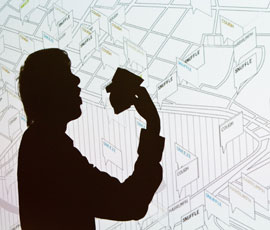Soon gadgets will exist that can listen to and understand sounds, drastically changing the way that we hear the world around us. Does this mean we will forget to listen for ourselves, or might we develop a greater awareness of the world of sound?
Researchers in the project are exploring 'machine listening' (where computers analyse and understand sounds from the world around us), which is starting to power devices that recognise surrounding activity and act accordingly. In particular they are interested in 'sparse representations'; choosing one sound from many possible sounds.
"People are amazing listeners," says Professor Mark Plumbley, a research leader in the Centre for Digital Music, in Queen Mary's School of Electronic Engineering and Computer Science. "We can recognize many sounds; pick out one from a mixture of many sounds; and we can judge complex properties of sound like rhythm and timbre. In this exhibition, we have explored how extremely difficult it is for conventional audio processing methods to do all these things that people take for granted."
"This exhibit 'Not Heard Yet' raises doubts whether having control over the sounds we hear necessarily changes our experience in a positive way," explains design collaborator Bernhard Hopfengaertner. "Perhaps this new technology will mean we develop a different consciousness for the sounds we produce and for the acoustic space in general. It will be interesting to see how they function as augmentations or amputations of our natural sound perception."
However Professor Plumbley points out that; "Rather like the way the internet has changed how we understand the world, machine listening can change our hearing experience for the better.
"New research is opening the way for devices that can identify a wide range of individual sounds, with diverse uses including: better hearing aids and cochlear implants; incident-detection systems for public places; and detailed audio searching on the internet," he says.



